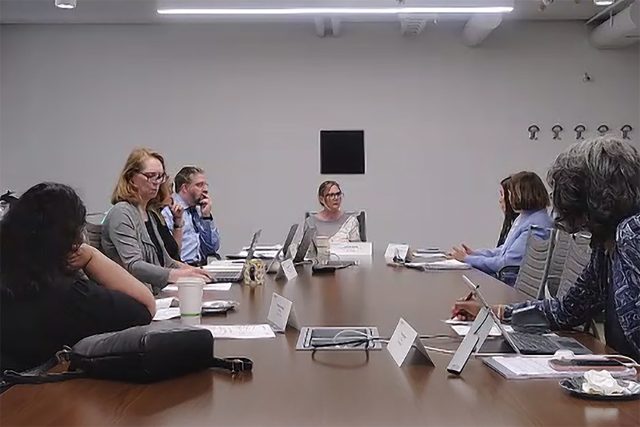[ad_1]
The University of Michigan’s Senate Advisory Committee on University Affairs met Monday afternoon to discuss potential new discrimination and harassment policies. The proposed policies aim to ensure that the University is in compliance with Title VI of the Civil Rights Act of 1964, which prohibits discrimination based on race and country of origin at institutions receiving federal financial funding.
Guests Tami Strickman, executive director of the U-M’s Equity, Civil Rights and Title IX Office, and Patricia Petrowski, U-M associate vice president and deputy general counsel, explained the policy to SACUA members, who raised concerns about how the policies could contradict the University’s commitment to freedom of expression.
The U.S. Department of Education’s Office for Civil Rights announced June 17 that they had entered a resolution agreement with the University in response to complaints against the University for antisemitic and anti-Palestinian discrimination. OCR alleged that the University did not take necessary steps to assess whether these incidents created a hostile environment for students, faculty or staff.
The resolution agreement required the University to review all of its policies and procedures to ensure they comply with Title VI. OCR also required the University to provide annual training on Title VI discrimination and harassment for U-M students and employees, a climate assessment and file reviews of the University’s response to reports of discrimination or harassment.
Petrowski said at the meeting the policy allowed for ECRT to be the main office for any matter deemed to be discriminatory on all bases related to race, ethnicity or ancestry.
“ECRT will be the front door for all discrimination and harassment complaints involving students,” Petrowski said. “Not all matters will need to go through a formal investigative process. I do anticipate that much of what we do under this policy, while there are certainly prescriptive procedures, will be really an emphasis on making sure people have resources of support to thrive in their educational environment.”
Strickman said the University is in the process of hiring a Title VI coordinator at the request of the Department of Education, who would help manage the new policies and reports for Title VI.
Derek Peterson, SACUA member and LSA professor, spoke about his concerns on the policy during the assembly meeting. Peterson said he believed the policy would force faculty to report to ECRT anything that could be seen as offensive, limiting the ideals of student activism.
“You’re effectively going to ask us as faculty to report on instances that other students might find discriminatory,” Peterson said. “Thus, opening up any ECRT investigation is both objectionable and hugely problematic in that it seems to open up for us, as faculty, the obligation against our will to regard legitimate student activism as though it were discriminatory under this newly defined rubric by which anyone who feels themselves to be discriminated against has to be investigated.”
Peterson also said he felt the policy could be harmful to faculty, who could face repercussions for not reporting on all the students who participate in protests.
“We’re obliged now, apparently, to report to (ECRT) under this new policy anything that might be interpreted as ‘subjectively or objectively offensive,’” Peterson said. “In other words, if we attend a protest that other students find objectionable, we have to report on what the protesters say to you all, or else we face sanctions ourselves.”
Strickman responded to Peterson by confirming that faculty should report such incidents if they are at a protest, although they would not be required to give specific information on students.
“We’re not suggesting that you get a notepad and write down students’ names, but if there’s something that you attend and you believe that others may have been subjected to some form of harm or at least have that perception, (we ask) that you let us know,” Strickman said.
Petrowski said many of OCR’s action items, such as the reporting requirement, were non-negotiable on the University’s end.
“Many of the requirements in the agreement, although we tried to negotiate, we were unable to do so,” Petrowski said.
Petrowski said several other universities have adopted similar policies after being under Title VI investigation by OCR. She said she believes the system allowing the University to act as a complainant will help investigations that do not have an individual willing to file a complaint.
“There have been a host of agreements like this that OCR has entered into after ours, and they’re virtually identical,” Petrowski said. “I think what’s being articulated there is that there are some circumstances where sometimes we’ll have an unwilling complainant, but ECRT may make a decision that they’re going to move forward in the absence of a complainant.”
SACUA chair Rebekah Modrak said she is concerned about the policy and what it could mean for the mission of the University and similar institutions across the country.
“My concern is that universities are willingly entering into agreements that are counter to the missions of the university,” Modrak said. “I mean, our job in teaching students is often to present information or perspectives that are challenging for them to accept and often potentially contentious in important ways.”
Daily News Editor Astrid Code and Daily Staff Reporter Audrey Shabelski can be reached at astridc@umich.edu and audres@umich.edu.
Related articles
[ad_2]
Source link











